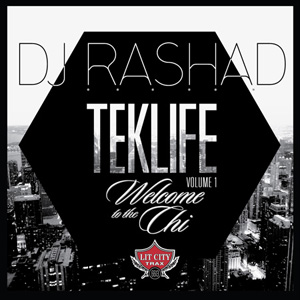DJ Rashad TEKLIFE Vol. 1: Welcome to the Chi
The strain of Chicago dance music known as footwork or juke has been an unavoidable […]

The strain of Chicago dance music known as footwork or juke has been an unavoidable influence on electronic music since Planet Mu released its Bangs & Works Vol. 1 compilation back in 2010. DJ Rashad‘s two contributions to that compilation were located, fortuitously, near the very beginning of the album—prime real estate for an uncompromising collection that threatened to induce whiplash if heard in one sitting. Following closely behind another potent 2012 release, Traxman‘s Da Mind of Traxman, TEKLIFE Vol. 1: Welcome to the Chi is DJ Rashad’s first full-length and offers another push into the arist-album world for the formerly hyper-local scene.
Rashad’s Bangs & Works Vol. 1 tracks demonstrate two tendencies that wend their way through TEKLIFE—futurist techno on the one hand and backwards-looking soul on the other. Bangs‘ “Teknitian” and “Itz Not Rite” correspond, more or less, to TEKLIFE‘s “Fly Spray” and “Feeling,” but you’re just as likely to encounter twitchy avant-garde and mollifying humanity in a single track. Rashad’s reconfigures himself restlessly, morphing songs in sly but absolute increments and leaving you in a radically different place from where you started. It’s a neat effect, and at times he does so with orchestral bombast: check out how he flips “Kush Aint Loud” from typically hard-ass juke to psychedelic funk and back. Usually, longer track lengths in dance music accommodate a relatively consistent rhythm and vibe, but while TEKLIFE‘s tracks average around four minutes, they regularly feel around 50% longer than their runtimes thanks to their stylistic fluidity. Those tonal contrasts do as much as the soul influence to give shelter from the punishing barrage of aggressively lopsided 160-bpm drums and asphyxiating vocal samples. These 20 tracks are busy, yet feel really spacious; they’re alive with ideas and brutal contradictions. This is particularly true of the second half of “Walk for Me,” which marries “Swims” to a long soul loop, the relaxed electric piano and vocal harmonies sitting uneasily astride a militant take on the Boddika & Joy O tune. With the following track, “CCP,” Rashad goes in for gleeful and unchecked overdrive, with spattered tom patterns and samples warped into a frenetic wall of glossolalia.
Rashad’s control over his materials adds a great deal of momentum to tracks that already feel fresh and innovative. This volatile quality, spending as much time bothering groove as locating it, is what distinguishes Chicago juke from the music informed by it. Even when Rashad approaches familiar songs, turning “Niggaz in Paris” into “Welcome to Chicago,” the industrial pistoning of the drums and a wandering, pricking woodblock undermine the familiarity of Kanye’s exhortations to not let him get in his zone. Some of the same points could be made about the Traxman album mentioned earlier—his riff on Prince’s “Let’s Go Crazy” sermon, “Lifeeeee Is for Ever,” accomplishes something similar to “Welcome to Chicago”—but you’d be hard pressed to confuse one producer with the other.
Juke has been around substantially longer than the two years it’s been on the global radar. As thrilling as Planet Mu’s compilation was, it didn’t foreshadow what Rashad, and by extension the genre, would be capable of over the course of a dedicated album. In the case of TEKLIFE, what could have been a step toward museumification feels instead like the future arriving in its own time.

